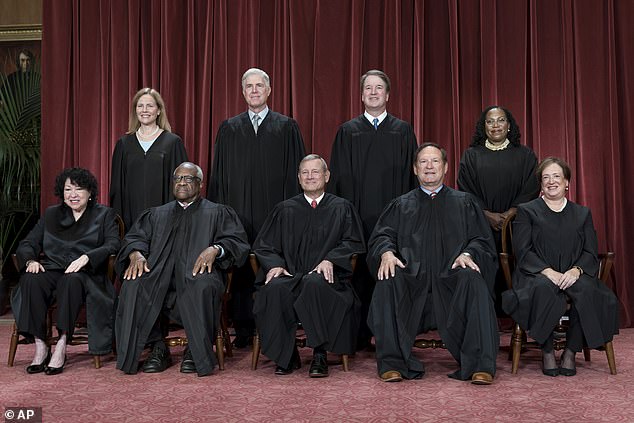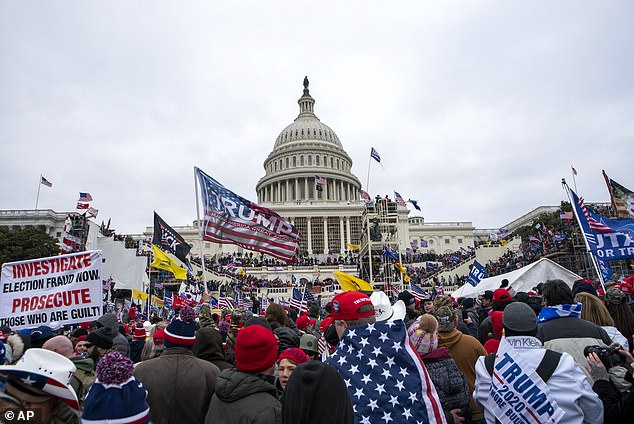Court panel gives Trump a week to ask Supreme Court to put an emergency pause on his DC trial – leaving it up to justices to decide whether he will face a D.C. jury in 2024
A landmark ruling by a federal Court of Appeals panel rejecting Donald Trump’s immunity claims leaves it up to the U.S. Supreme Court whether it will deliberately delve into lofty constitutional questions or rush his criminal trial.
Regardless of the final outcome, whether and how the Supreme Court will intervene will have a substantial impact on the political clock — and whether Trump will stand trial before a jury in Washington, DC, before Election Day.
The three-judge panel unanimously ruled Tuesday that Trump’s “alleged efforts to cling to power despite losing the 2020 election would, if proven, constitute an unprecedented attack on the structure of our government.”
Not only did it rule against Trump, who called the decision “nation-destroying,” but it also set a clock in a way that seemed designed to move things forward.
Former President Donald Trump has until February 12 to ask the Supreme Court to hear his case and request a stay of judicial mandate that would allow his criminal trial in Washington DC to resume. Trump’s team has already bought him valuable time, but some experts are now predicting that the Supreme Court will not hear the case after a unanimous three-judge ruling against him
The court has ruled that it will not issue any further ‘mandates’ until the end of Monday, February 12, suspending his trial in Washington DC during that time.
If Trump goes to the U.S. Supreme Court during that short window to ask to hear the case, the court says it will delay issuing the mandate even longer until it ultimately reaches a final decision at the Supreme Court. Trump can also ask the Supreme Court to suspend that mandate during that time, putting his trial on hold during the appeal.
It provides an incentive for Trump’s team to act hastily as it considers an appeal, which Trump’s camp already said it would file.
But in another step, the court’s order indicated that Trump wouldn’t be so lucky if he sought a different kind of hearing — calling for a rehearing of the case or an “en banc” review of the entire judicial circuit.
Such a move would have the potential to delay his trial even further. If Trump were to go that route, his trial in DC could resume again while he appealed.
“It’s a really bold move,” said Scott R. Anderson, fellow in Governance Studies at the Brookings Institution, during a speech on Law podcast.
He said the court “sent a strong message: Look, it’s not worth applying or these mandates will go back into effect.”

The Supreme Court could decide to appeal and consider Trump’s immunity claim. Or it could take an agreement and allow the ruling of a unanimous three-judge panel to stand, which would start the clock ticking toward Trump’s criminal trial.

The suit accuses Trump of pressuring officials not to certify Joe Biden’s 2020 election victory during the lead-up to the Jan. 6 attack on the U.S. Capitol.
His own prediction, echoed by some other legal experts who took a chance on the Supreme Court, was that it would not hear the case — especially in light of the way the appeals court panel formed its ruling.
‘I don’t think the Supreme Court wants to get involved in this. I think it is a very weak legal argument from former President Trump. “I think the D.C. Circuit has done a good enough job of narrowing its opinion and targeting and tailoring its opinion,” he continued. He predicted that the Supreme Court would essentially say, “I think we’re okay with their handling of this particular case and would just as soon not get directly involved in it.” It’s going to be a messy situation for all of us,” he said.
The deadline keeps things moving, especially if the Court decides not to grant certiorari and hear the case.
“That’s very fast and will require him to find residence in an all-DC circuit (unlikely) or in Supreme Ct. before then,” wrote University of California law professor Harry Litman.
Five justices on the 6-3 conservative court could enter such a delay, which would put the Trump trial on hold. Four judges would be enough to hear the case.
Trump appointed three judges to the Court.
Trump is confident he will win on appeal. But even if his claim for immunity from criminal prosecution does not hold up during his time in office, he has already bought valuable time. Federal District Court Judge Tanya Chutkan had scheduled the start of his trial for next month, the day before Super Tuesday, which could be the time when he could find enough delegates to become the Republican Party’s presidential nominee.
Even if the Supreme Court approves the case, the trial may not begin until June, thanks in part to the assurances Chutkan has given his lawyers.
“A nation-destroying statement like this cannot stand,” Trump wrote on his Truth Social site. “If this decision is not reversed, as it should be, it would do terrible damage not only to the presidency, but to the life, breath and success of our country.”
